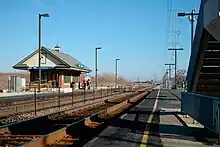Bellwood, Illinois | |
|---|---|
 logo | |
| Motto: "Your Family Is Our Future"[1] | |
 Location of Bellwood in Cook County, Illinois. | |
.svg.png.webp) Location of Illinois in the United States | |
| Coordinates: 41°52′59″N 87°52′35″W / 41.882924°N 87.876428°W | |
| Country | United States |
| State | Illinois |
| County | Cook |
| Township | Proviso |
| Incorporated | 1900 |
| Government | |
| • Mayor | Andre F. Harvey |
| Area | |
| • Total | 2.40 sq mi (6.21 km2) |
| • Land | 2.40 sq mi (6.21 km2) |
| • Water | 0.00 sq mi (0.00 km2) |
| Population (2020) | |
| • Total | 18,789 |
| • Density | 7,835.28/sq mi (3,025.05/km2) |
| Time zone | UTC-6 (CST) |
| • Summer (DST) | UTC-5 (CDT) |
| ZIP Code(s) | 60104 |
| Area codes | 708/464 |
| FIPS code | 17-04975 |
| Website | www |
Bellwood is a village in Proviso Township, Cook County, Illinois, United States. Located 13 miles (21 km) west of Chicago's downtown Loop, the Village of Bellwood is bounded by the Eisenhower Expressway (south), the Proviso yards of the former Chicago & Northwestern, now Union Pacific Railroad (north), and the suburbs of Maywood (east) and Hillside and Berkeley (west). The population was 18,789 at the 2020 census.[3]
History
Bellwood was incorporated on May 21, 1900. The municipality took its name from one of the village's early subdivisions, "Bellewood". However, in later years, the final "e" was dropped. The region, which was mostly flat grassland, was initially mostly farmland. A few businesses, including a few taverns, were drawn to the initial subdivision. In reaction to dry Maywood's effort to annex the area, businesses that served alcohol petitioned for incorporation. Between 1900 and 1930, Bellwood's population numbers increased steadily. By 1920, the village's population of 943 had more than quadrupled, with many German and Russian immigrants. The increase to 4,991 persons in 1930 is due to the annexation of territory west of Mannheim Road in 1926, as well as ongoing migration.
The Chicago, Aurora and Elgin Railway and the Chicago & North Western Railway provided rail passenger service, which promoted residential growth in neighboring portions of Bellwood. The 1970s saw racial upheaval and inclusion in a Supreme Court case in the United States. Bellwood sued a local real estate company in 1975, alleging racial discrimination. Four years later, the Supreme Court issued a historic decision allowing governments to utilize testers and sue when discrimination occurs. The black population of Bellwood jumped from 1.1 percent in 1970 to 35 percent in 1980 and 70 percent in 1990.
A few major firms exist in Bellwood today, but the collapse of many other large sectors has resulted in a decrease in employment and tax revenue. Despite these contributions, the community saw some new development as a result of various minor industrial and commercial organizations.
Geography
According to the 2021 census gazetteer files, Bellwood has a total area of 2.40 square miles (6.22 km2), all land.[4]
Demographics
| Census | Pop. | Note | %± |
|---|---|---|---|
| 1910 | 943 | — | |
| 1920 | 1,881 | 99.5% | |
| 1930 | 4,991 | 165.3% | |
| 1940 | 5,220 | 4.6% | |
| 1950 | 8,746 | 67.5% | |
| 1960 | 20,729 | 137.0% | |
| 1970 | 22,096 | 6.6% | |
| 1980 | 19,811 | −10.3% | |
| 1990 | 20,241 | 2.2% | |
| 2000 | 20,535 | 1.5% | |
| 2010 | 19,071 | −7.1% | |
| 2020 | 18,789 | −1.5% | |
| U.S. Decennial Census[5] 2010-2020[6] | |||
As of the 2020 census[7] there were 18,789 people, 6,059 households, and 4,310 families residing in the village. The population density was 7,835.28 inhabitants per square mile (3,025.22/km2). There were 6,757 housing units at an average density of 2,817.76 per square mile (1,087.94/km2). The racial makeup of the village was 68.35% African American, 6.67% White, 0.96% Native American, 0.72% Asian, 0.02% Pacific Islander, 15.83% from other races, and 7.45% from two or more races. Hispanic or Latino of any race were 26.79% of the population.
There were 6,059 households, out of which 36.1% had children under the age of 18 living with them, 38.54% were married couples living together, 26.18% had a female householder with no husband present, and 28.87% were non-families. 27.03% of all households were made up of individuals, and 12.44% had someone living alone who was 65 years of age or older. The average household size was 3.79 and the average family size was 3.09.
The village's age distribution consisted of 23.7% under the age of 18, 8.9% from 18 to 24, 27.8% from 25 to 44, 25.5% from 45 to 64, and 14.2% who were 65 years of age or older. The median age was 36.1 years. For every 100 females, there were 84.4 males. For every 100 females age 18 and over, there were 77.3 males.
The median income for a household in the village was $63,006, and the median income for a family was $69,730. Males had a median income of $38,361 versus $32,466 for females. The per capita income for the village was $27,244. About 8.3% of families and 11.1% of the population were below the poverty line, including 13.1% of those under age 18 and 12.3% of those age 65 or over.
| Race / Ethnicity | Pop 2010[8] | Pop 2020[6] | % 2010 | % 2020 |
|---|---|---|---|---|
| White alone (NH) | 907 | 545 | 4.76% | 2.90% |
| Black or African American alone (NH) | 14,240 | 12,705 | 74.67% | 67.62% |
| Native American or Alaska Native alone (NH) | 16 | 19 | 0.08% | 0.10% |
| Asian alone (NH) | 116 | 119 | 0.61% | 0.63% |
| Pacific Islander alone (NH) | 1 | 2 | 0.01% | 0.01% |
| Some Other Race alone (NH) | 26 | 65 | 0.14% | 0.35% |
| Mixed Race/Multi-Racial (NH) | 169 | 300 | 0.89% | 1.60% |
| Hispanic or Latino (any race) | 3,596 | 5,034 | 18.86% | 26.79% |
| Total | 19,071 | 18,789 | 100.00% | 100.00% |
Government
Andre F. Harvey is the current and Bellwood's first African-American mayor.[9]
Education
The Bellwood School District 88 comprises seven schools: Grant Primary School, Grant Elementary School, Lincoln Primary–Early Childhood Center, Lincoln Elementary School, McKinley Elementary School, Thurgood Marshall Elementary School and Roosevelt Middle School. Some portions are zoned to Berkeley School District 87.[10]
MECA Christian Academy is a private school.[10]
Infrastructure
Transportation
The village is serviced by a Metra railroad station with commuter service to Chicago. In November 2011, Union Pacific Railroad announced plans to renovate and upgrade Bellwood's Metra station and add a third rail line. The project, estimated at $4 million, was expected to be completed by the fall of 2012 at no cost to residents.[11] Bellwood formerly had a station on the Chicago Great Western Railway main line before it was abandoned in 1968 by the Chicago & Northwestern Railway. The Indiana Harbor Belt Railroad runs through Bellwood, but does not host any commuter rail traffic.
Notable people
- Lee J. Archambault, NASA astronaut, served aboard two space shuttle missions (STS-117 & STS-119)[12]
- Eugene Cernan, NASA astronaut, commander of the Apollo 17 mission and "last man on the Moon," grew up in Bellwood
- Robert Covington, small forward for the Los Angeles Clippers, was born in Bellwood.
- Ben Tennyson, the fictional American superhero was portrayed as being born in Bellwood
References
- ↑ "Village of Bellwood, Illinois". Village of Bellwood, Illinois. Archived from the original on September 5, 2012. Retrieved August 31, 2012.
- ↑ "2020 U.S. Gazetteer Files". United States Census Bureau. Retrieved March 15, 2022.
- ↑ "Bellwood village, Illinois". United States Census Bureau. Retrieved January 30, 2022.
- ↑ Bureau, US Census. "Gazetteer Files". Census.gov. Retrieved June 29, 2022.
- ↑ "Decennial Census of Population and Housing by Decades". US Census Bureau.
- 1 2 "P2 HISPANIC OR LATINO, AND NOT HISPANIC OR LATINO BY RACE - 2020: DEC Redistricting Data (PL 94-171) - Bellwood village, Illinois". United States Census Bureau.
- ↑ "Explore Census Data". data.census.gov. Retrieved June 28, 2022.
- ↑ "P2 HISPANIC OR LATINO, AND NOT HISPANIC OR LATINO BY RACE - 2010: DEC Redistricting Data (PL 94-171) - Bellwood village, Illinois". United States Census Bureau.
- ↑ "Bellwood gets first Black mayor in 117 years". April 14, 2017.
- 1 2 "Schools." Village of Bellwood. Retrieved March 16, 2017.
- ↑ "Update Newsletter, December 2011" (PDF). Village of Bellwood. Archived from the original (PDF) on April 25, 2012. Retrieved December 2, 2011.
- ↑ "Astronaut Bio: Lee Joseph Archambault". National Aeronautics and Space Administration. February 11, 2015. Retrieved January 19, 2016.

